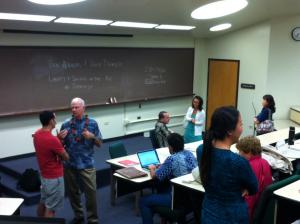Debate over national security highlighted in January-Term seminar at UH Law School
University of Hawaiʻi at Mānoa
UH Law School students and the public had the opportunity to discuss the razor’s edge issue of national security vs. individual privacy with Edward Snowden attorney Ben Wizner and retired Army General David Bramlett over the course of a unique week of seminar classes at the UH Law School. Students also learned from leading U.S. scholars about international law, environmental issues, and the current state of the legal profession.
January Term – or J-Term – is the annual schedule of bonus mini-courses held during winter break each year that brings foremost legal scholars and advocates to the William S. Richardson School of Law on the UH Mānoa campus. The weeklong seminars offer extra credit for law students, thought-provoking offerings for the community, and - this year - continuing legal education credits for practicing attorneys.
On the final day of one of the seminars, students, attorneys, members of the public and seminar leaders Wizner and Bramlett had a lively discussion weighing the use of domestic surveillance by the government against individual privacy rights.
Bramlett and Wizner taught this weeklong seminar together, often respectfully disagreeing with each other while engaging the students and community members who attended. Wizner, director of the ACLU Speech, Privacy & Technology Project, has been the lead American attorney for NSA whistle-blower Snowden. Bramlett is a former Commandant at West Point who retired in 1998, ending his military career as Commanding General of U.S. Army Forces Command, responsible for training and deploying forces worldwide in support of theater Combatant Commanders.
Asked Wizner, “Where do we set the dial and how do we make sure it gets set in the right place? We know from Snowden’s revelations that the phone calls in this room were captured. Does it bother you that they’re sitting in a government file? Every phone call is turned over to the NSA and stored for five years. As far back as the 1990s, top leaders of al-Qaeda stopped using cellphones because they were worried about missiles targeting their phones.”
Said Bramlett: “We talk about how bad apples used some of the data to discredit individuals – that’s the frailty of my position. I worry about abuse.” And yet Bramlett said he wants to look for every edge that will make our country safe, and that may include collection of meta-data from cellphone calls. He recognizes, however, that “safeguards” are absolutely necessary to prevent abuse of that data, which occurred when FBI director J. Edgar Hoover used clandestine intelligence to target political enemies.
“Snowden does talk about the migration of information collected by one agency used by another,” said Wizner. “It’s not only use of it, but misuse of it.”
Congress has repeatedly investigated clandestine government surveillance, going back to the 1960s and 1970s when civil rights organizations, along with anti-war activists, and leaders of the women’s liberation movement were targeted for surveillance because of their agitation for social change. Wizner said letters were even sent to Martin Luther King Jr. by the FBI threatening to reveal extramarital affairs and suggesting that King commit suicide.
“What safeguards do we put in place to make sure this doesn’t happen again?” Bramlett asked. “We have to ask ourselves, what are the safeguards? Institutional? Legal?”
Bramlett noted that in Washington, D.C., for example, “there are 500,000 cameras . . . Cameras are everywhere.”
While Wizner and Bramlett represented two sides of the on-going controversy, the session ended with no clear answer. As Wizner commented, “This is a problem without a solution.” The way forward for all of us, he said, is to be active citizens, and “we should pay attention, be involved, and not trust all these decisions to wise leaders.”
In the other J-Term seminars, Professors Richard Lazarus of Harvard Law School, Harold Koh of Yale Law School and Robert Gordon of Stanford Law School also taught full classes.
Lazarus is the Howard J. and Katherine W. Aibel Professor of Law at Harvard, as well as the Thurgood Marshall Professor of Constitutional Law at Harvard. He was the Richardson Law School’s Frank Boas Visiting Harvard Professor, and he was paid from funds provided by the late Frank Boas, a generous longtime supporter of the Law School.
Koh is the Sterling Professor of International Law at Yale, and a former Dean of Yale Law School who has had extensive experience in the State Department. Gordon is the Chancellor Kent Professor of Law and Legal History, Emeritus at Yale Law School, who has now returned to teaching law at Stanford.
Third-year law student Rebecca Soon ’16 offered a welcoming chant of aloha just before the final lesson began in Koh’s course, and in the Wizner/Bramlett class. Soon has taken three J-Term classes and calls them “a valuable opportunity to be submerged for a week in unique, niche areas of the law.
“Professors are highly accomplished in their fields, have a deep passion for their work, and travel from around the world to be with us,” said Soon in admiration of the special opportunity provided by J-Term. “I was honored this year to be able to take both Liberty and Security and International Human Rights. Both were the perfect examples of the kind of unique content that J-term is able to explore with world renowned lawyers in the field.”
For more information, visit: https://www.law.hawaii.edu/

